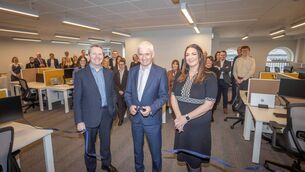Retiring early may not be just a fantastic notion

Retiring early: Save as much of your income as you can, with new or additional pension contributions, and take advantage of the generous tax relief on pension savings.
You can retire early if you build a realistic plan for how you will finance your retirement, advises , managing director of Contracting PLUS Financial Ltd and Her Money

If you are dreaming about swapping the daily grind for a more relaxed lifestyle, by retiring early, then a goal this big certainly requires a big plan. But it is by no means an impossible dream, and these tips will help you achieve it.
Firstly, identify your unique desired retirement age – maybe 50, 60 or 63? Then, quantify your approximate expenses in retirement, so you have a good idea of the retirement income you will need, and for how many years. You then have a goal for retirement pot savings, and know how many years saving you have, to achieve this goal.
Early retirement generally relies on setting up a suitable pension scheme, as soon as possible. Review your pension – you may have more than one – and engage with a financial advisor on what your funds are likely to be worth at your set retirement date.
Aim to save as much of your income as you can, with new or additional pension contributions, and take advantage of the generous tax relief on pension savings. Ensure you diversify your investment in a wide mixture of assets.
Pay off as much of your debt as you can, and evaluate future big purchases, requiring borrowing, in terms of what the expenditure will mean for possible early retirement. You can reach your retirement goals so much faster, without debt or mortgage payments to worry about, and can invest that money in your pension instead.
Financially planning for early retirement is like planning a long road trip. Simply knowing your destination isn’t enough—you have to know where you’re starting from, and how far you need to go to get there.
Assess your main cost centres now, from household bills to holidays or socialising, and determine if savings can be made, by switching service providers or just cutting back.
Ask yourself, how hard am I willing to work now, so I can retire early? The dream of quitting paid work is all well and good, but you must be willing to do the hard work and make sacrifices.
Nothing of value comes without a price. Cut out frivolous spending, like numerous holidays, luxury gifts, or unnecessary subscriptions or memberships. Decide if there is a sideline or extra work that will boost your pension pot. It’s all in your hands, as to whether or not you get to retire early!
When you reckon you are ready to say goodbye to your job, there are practical things to think through, and maybe action, to take full advantage of your wealth potential.
- Revisit your lifestyle in retirement. Are you on the same retirement page as your partner? What are your expectations about travel and hobbies? Imagine your ideal post-retirement daily routine.
- Consider your retirement location. Before you retire, think about where you want to live. Do you plan to move? Will you downsize? Do you want to live close to family? Decide on these factors before you retire. An unplanned move, after retirement, could take a major bite out of your savings.
- Decide whether you will work. Will you need to work part time to earn a little extra income, or do you ideally want to retire completely? Maybe you might start your own business? Think about these areas before burning your business connections. It is your future, and you get to decide how it will look!
Keep an eye on your money, ask questions about concepts and terminology that do not make sense, and do not make any major decisions on your financial portfolio without discussing them with your advisor.
Income in retirement is treated as regular income, subject to the same taxes. This includes annuity income, ARF withdrawals, taxable cash payments, dividend income and rental income.
You are subject to income tax at your marginal rate, PRSI (if applicable), and USC. However, once you’re 65, you may be exempt from paying income tax if you avail of the exemption limit. This allows a single person to earn up to €18,000, or a married couple to earn up to €36,000, without paying income tax. This amount increases if you still have dependent children.
You will still be subject to USC if your income is over €13,000 per annum and when you turn 66, you will stop paying PRSI. This saving may be accessed earlier, if you draw down from a private work pension, as some private pensions are not subject to PRSI, regardless of age. Plus, there is a reduction in USC when you turn 70.
So if your dream is to retire early, start planning today! Engaging expert financial advice to help you review your existing pension and investment plans and make a realistic budget is key. Sticking with the overall plan and the budget and indeed ensuring that you are aware all of your options when it comes to stopping work are all key to making this early retirement dream a pleasant reality.







